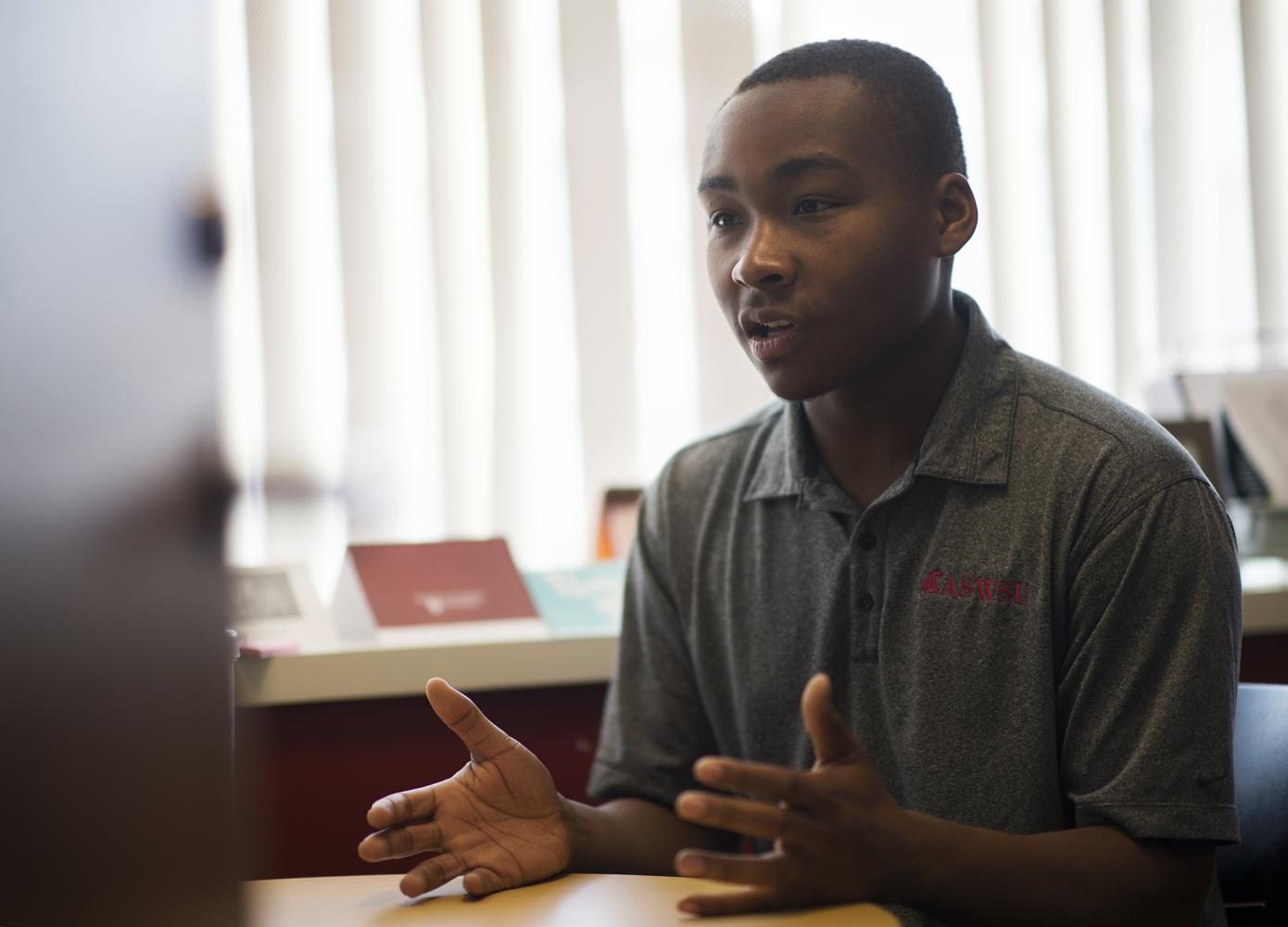Campus government works with student fees
ASWSU makes decisions that affect all aspects of student life
LUKE HOLLISTER | The Daily Evergreen
ASWSU President Jordan Frost talks about the student government budget, salaries and his strategies to help students have a good experience at WSU Tuesday at Frost’s office in the CUB.
August 23, 2017
As students return to school, ASWSU officers return to their duties as stewards of the hundreds of thousands of university dollars, and as liaisons between the students and the university administration.
In his role as ASWSU president, Jordan Frost meets with university leaders and the WSU president regularly. His duties as a paid employee of the university range from overseeing budgets and large projects to networking within the university.
“There is not a single area of the university that ASWSU hasn’t touched before,” Frost said. “We have a seat at the table with [WSU] President [Kirk] Schulz.”
In an email, Brian Shuffield, executive director of Student Involvement, said both the ASWSU president and vice president receive a salary from the university equivalent to the cost of attendance, $26,998. ASWSU senators receive a more modest sum, $1,980 a year, committee chairs are paid $2,310 and the ASWSU Senate pro tempore receives $3,900.
Under the university Constitution, it is the ASWSU president’s responsibility to act and make decisions as any normal CEO would for a corporation.
“The way I look at that is vision, strategic planning, resource management and personnel,” Frost said. “My job is to take us places where we currently aren’t.”
Specifically, the president is responsible for nominating committee members within the 13 ASWSU programming and service committees, the election board and any other internal committees created.
The president is also tasked with being a part of committees who nominate for university cabinet-level positions and cutting executive programs if necessary.
The ASWSU president also has a hand, though not a final say, in how the executive branch uses its $325,000 budget. ASWSU Vice President Garret Kalt said his role is focused on the internal workings of ASWSU. Kalt chairs the Senate meetings and serves as a liaison for the programming and service committees.
The executive branch also works in tandem with the legislative branch, composed of the Senate and its respective committees.
The Senate has confirmation power over all presidential appointments and presides over each of the committee budgets, which will amount to about $135,000 this year. This money will be used for staff pay and registered student organizations seeking funding, Frost said.
The Senate can also pass bills to change ASWSU bylaws, as well as aspects of its constitution.
Resolutions are documents asking for action from people such as Schulz and state politicians. Like bills, they go through the proper committees and are passed by the Senate.
Frost said ASWSU had a large role in building projects such as the CUB and the Chinook Student Center, which cost about $60 million and $32 million respectively and came mostly from student funds. They also decide how revenue from both buildings is allocated each year, he said.
Senator At-Large James Dalton, who represents all undergraduate students at WSU, said in an email that he takes the responsibility of governing seriously.
“When I vote, I must take into consideration the larger picture and how it might impact everybody,” Dalton said. “I believe the primary job of a senator is to provide a voice for students and ensure they are represented to the best of my ability.”
Senator At-Large Tyler Parchem echoed these sentiments.
“A senator has a duty to represent their body of campus they vote on behalf of,” Parchem said. “By representing their specific body we must take into account all of our constituents, far and wide, and represent all the diverse views.”
The key difference between the legislative and executive branches is scope of power. The ASWSU legislature regulates student fund appropriation and the president’s policies.
In contrast, Frost said, the executive role is more external, allowing for meetings with higher-level university officials, and, in some cases, the state government in Olympia.
Frost said the general student body should care about student government because it was formed to work for them, and deals with money they pay toward fees. If students want fees reduced, he said, they should talk to ASWSU and tell them what they think is important, as well as what they can live without.
“It’s their money,” Frost said. “Everywhere that ASWSU is involved, student dollars are involved.”











